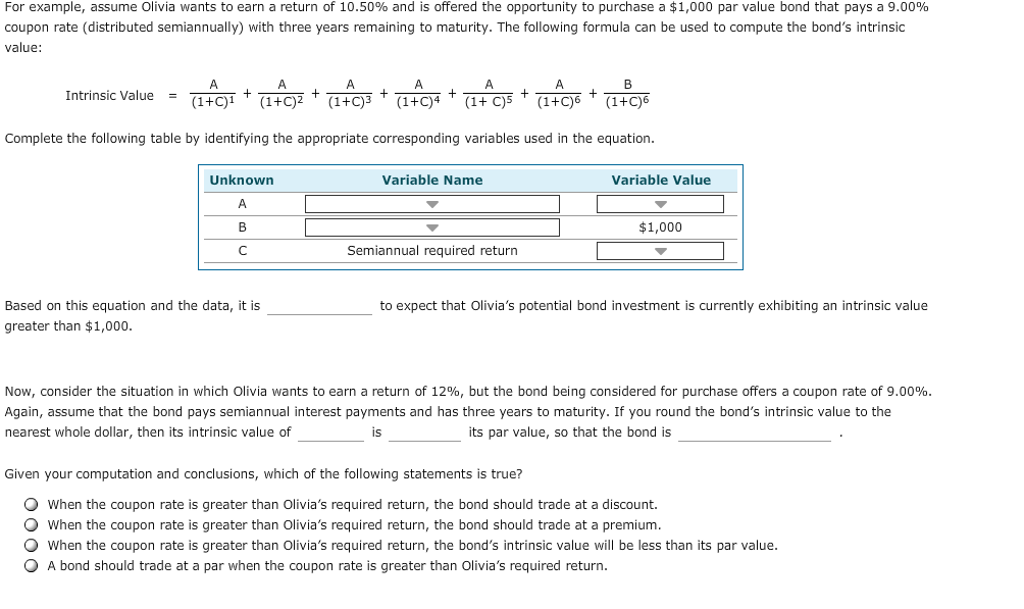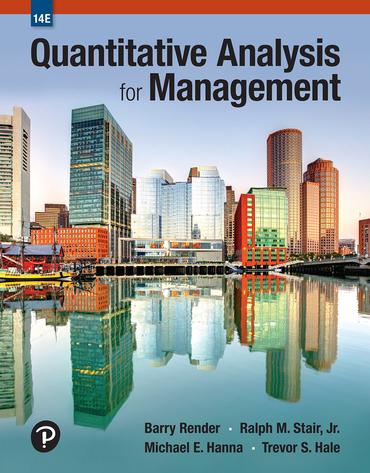
For example, assume Olivia wants to earn a return of 10.50% and is offered the opportunity to purchase a $1,000 par value bond that pays a 9.00% coupon rate (distributed semiannually) with three years remaining to maturity. The following formula can be used to compute the bond's intrinsic value: Intrinsic value = A/(1 + C)^1 + A/(1 + C)^2 + A/(1 + C)^3 + A/(1 + C)^4 + A/(1 + C)^5 + A/(1 + C)^6 + A/(1 + C)^6 Complete the following table by identifying the appropriate corresponding variables used in the equation. Based on this equation and the data, it is to expect that Olivia's potential bond investment is currently exhibiting an intrinsic value greater than $1,000. Now, consider the situation in which Olivia wants to earn a return of 12%, but the bond being considered for purchase offers a coupon rate of 9.00%. Again, assume that the bond pays semiannual interest payments and has three years to maturity. If you round the bond's intrinsic value to the nearest whole dollar, then its intrinsic value of is its par value, so that the bond is. Given your computation and conclusions, which of the following statements is true? When the coupon rate is greater than Olivia's required return, the bond should trade at a discount. When the coupon rate is greater than Olivia's required return, the bond should trade at a premium. When the coupon rate is greater than Olivia's required return, the bond's intrinsic value will be less than its par value. A bond should trade at a par when the coupon rate is greater than Olivia's required return. For example, assume Olivia wants to earn a return of 10.50% and is offered the opportunity to purchase a $1,000 par value bond that pays a 9.00% coupon rate (distributed semiannually) with three years remaining to maturity. The following formula can be used to compute the bond's intrinsic value: Intrinsic value = A/(1 + C)^1 + A/(1 + C)^2 + A/(1 + C)^3 + A/(1 + C)^4 + A/(1 + C)^5 + A/(1 + C)^6 + A/(1 + C)^6 Complete the following table by identifying the appropriate corresponding variables used in the equation. Based on this equation and the data, it is to expect that Olivia's potential bond investment is currently exhibiting an intrinsic value greater than $1,000. Now, consider the situation in which Olivia wants to earn a return of 12%, but the bond being considered for purchase offers a coupon rate of 9.00%. Again, assume that the bond pays semiannual interest payments and has three years to maturity. If you round the bond's intrinsic value to the nearest whole dollar, then its intrinsic value of is its par value, so that the bond is. Given your computation and conclusions, which of the following statements is true? When the coupon rate is greater than Olivia's required return, the bond should trade at a discount. When the coupon rate is greater than Olivia's required return, the bond should trade at a premium. When the coupon rate is greater than Olivia's required return, the bond's intrinsic value will be less than its par value. A bond should trade at a par when the coupon rate is greater than Olivia's required return







